- 2.5Impact Factor
- 4.6CiteScore
- 18 daysTime to First Decision
News & Conferences
Latest News & Announcements
Latest Conferences
Propose a Conference Collaboration
Promote and publicise your upcoming conference with MDPI.
All News & Conferences
News & Announcements
Article Layout and Template Revised for Future Volumes
11 December 2025
News & Announcements
World Soil Day—“Healthy Soils for Healthy Cities”, 5 December 2025
5 December 2025
5 - 5 December 2025
News & Announcements
MDPI Webinar | World Soil Day, 5 December 2025
28 November 2025
News & Announcements
Recruiting Early Career Editorial Board Members for Forests
18 November 2025
News & Announcements
MDPI Launches the Michele Parrinello Award for Pioneering Contributions in Computational Physical Science
6 November 2025
News & Announcements
MDPI INSIGHTS: The CEO's Letter #28 - WSF11, Nobel Laureates, Proofig AI, Romania Summit, STM and FBF
4 November 2025
MDPI Conference
The 6th International Electronic Conference on Remote Sensing—Global Perspectives for the Next Generation in Earth Observation
19 - 21 October 2026
News & Announcements
Free Media Partnership Between Agriculture and Forests and the 14th International Conference of Young Scientists, “The Young Scientists for the Advance of Agriculture” (AGRISCI 2025), 26 November 2025, Vilnius, Lithuania
24 October 2025
News & Announcements
Forests | Invitation to Read Editor’s Choice Articles Selected from Volume 16, Issues 7–9
17 October 2025
News & Announcements
Meet Us at the American Geophysical Union (AGU) Fall Meeting 2025, 15–19 December 2025, New Orleans, Louisiana, USA
16 October 2025
of 22











